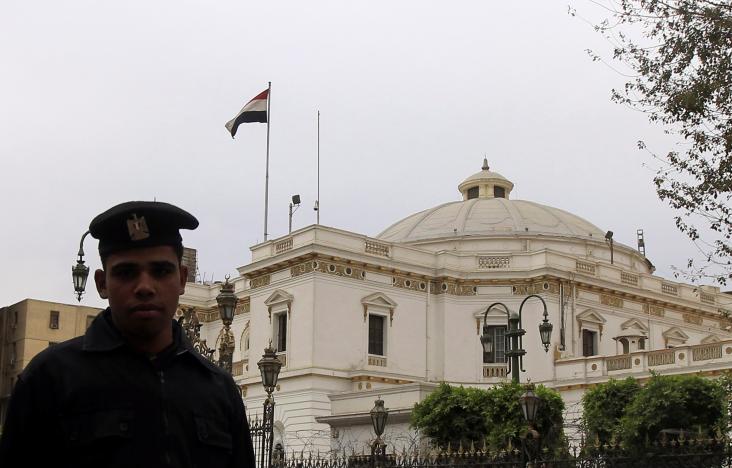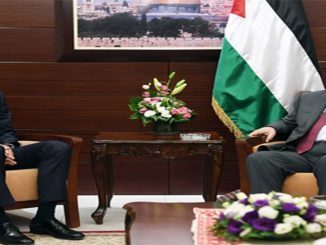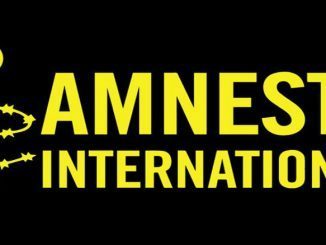
After ratifying the controversial NGO law, Abdel Fattah al-Sisi has recently ordered the formation of a committee to amend it, following the international criticism he is under for repressing freedoms.
Egyptian Prime Minister Mustafa Madbouly issued a decision Nov. 17 to form a committee led by Minister of Social Solidarity Ghada Wali to amend law No. 70 of 2017 for nongovernmental organizations (NGOs) and civil society organizations. This comes two years after a two-third parliamentary majority approved the law, despite fierce local and international criticism.
In accordance with Madbouly’s decision, the committee is solely responsible for preparing a comprehensive vision to amend the law, while resorting to the ministries and bodies concerned with the work of civil society organizations for advice, and “taking advantage from similar international experiences in this regard.”
The decision states that the committee shall — within a period of one month — prepare a full report about the results of its work and the draft law, to be presented to the Cabinet and parliament for approval.
This committee formation comes in response to President Abdel Fattah al-Sisi’s call Nov. 6, in his speech at the World Youth Forum, to form a ministerial committee to amend the law. “I would like to tell everyone inside and outside of Egypt that we are keen to keep the law balanced so it achieves what is required in terms of properly organizing the work of NGOs,” Sisi said.
Sisi himself had ratified this law on May 29, 2017, ignoring calls from civil society to veto it and refer it back to parliament for amendment.
As soon as Sisi called for the amendment of the law in early November, parliament expressed willingness to make substantial amendments. Back in 2016 when the law was approved by a two-third majority in parliament, Speaker Ali Abdel Aal had stressed that the law goes in line with global principles and foundations.
Parliament spokesman Salah Hasaballah said Nov. 7 that the current law provides a large space for civil society organizations to work freely, but it was issued under certain controls that reflected the nature of the situation back then, when human rights organizations emerged and were believed to be receiving funding and spending money without the state’s knowledge. “Once the state enters into a more stable stage, the provisions of the current law could turn out to be inappropriate and thus can be amended,” he said.
Because of this law, the government was criticized at home and by foreign parties as it includes items that, for the first time, subject civil society organizations and all sovereign bodies to security control. Other items even provide for imprisonment in case of administrative offenses.
Articles 70-72 provide for the establishment of a national body to regulate the work of foreign NGOs in Egypt. The body shall consist of the ministries of interior, foreign affairs, defense, justice and international cooperation, the General Intelligence and the Administrative Control Authority. The body supervises the external funding of NGOs as well as oversees all of their activity and is responsible for granting permits.
Article 87 provides that administrative offenses are sentenced to up to five years in prison and a fine of 1 million Egyptian pounds (roughly $56,000) for whoever is proven to have received money from foreign sources or has spent such funds on other than what the money was made available for.
The same article provides for imprisonment of whoever participated in or cooperated with any foreign organization in Egypt without obtaining a license from the body, or participated in conducting any opinion polls without obtaining official approval.
Article 66 prohibits NGOs from employing foreigners in the form of experts, or temporary or permanent workers without obtaining a license from the body.
Following Sisi’s ratification of the law, the United Nations, together with members of the US Congress, criticized the government on June 1, 2017. The UN High Commissioner for Human Rights, Prince Zeid Ra’ad Al Hussein, said the new law “effectively hands over the management of NGOs to the government.” Meanwhile, Republican Sens. John McCain and Lindsey Graham said in a joint statement that Sisi’s approval was the latest sign “of a growing crackdown on human rights and peaceful dissent.”
On Nov. 15, the Egyptian Organization for Human Rights stressed the right of NGOs to obtain funding without being charged with receiving funding from abroad and without anyone interfering in their administrative affairs.
Meanwhile, Wali noted in a Nov. 17 statement that the committee will conduct a community dialogue and use the best international experiences in the legislation governing the work of NGOs to ensure that the new law satisfies everyone. On the other hand, observers question Sisi’s seriousness in making amendments.
Mohamed Zare, researcher at the Cairo Institute for Human Rights Studies, told Al-Monitor that the current regime does not believe in any freedom for civil society in Egypt and considers anyone who criticizes the regime as an enemy of the state.
Zare believes Sisi’s decision was primarily to appease civil society. Thus, he noted, any amendments made by the state would not affect the essence of the law and the fact that it would lead to repression, restriction and control.
Hafez Abu Saada, member of the National Council for Human Rights, told Al-Monitor that the council sent 20 remarks to the committee, namely removing the imprisonment clause all together, preventing all interference in the affairs of NGOs and eliminating all articles that are against freedom.
Abu Saada said that the government — despite its lack of interest in civil society and its desperate attempt to control it — is afraid to be seen by the world as being against freedom, which puts it under international pressure. This is why it will amend the law but it does not look promising, he said.
Government spokesman Nader Saad told Al-Monitor that Madbouly closely follows the work of the committee, pending the draft, so it can be adopted and presented to parliament for discussion and approval.
According to Saad, Madbouly stressed that the committee should include all the parties concerned, introduce the law through community dialogue and listen to all opinions and take them into consideration, to give civil society more freedoms while preserving the national security of the country. “Madbouly could resort to a redraft to change some of the articles or make certain amendments where necessary,” he added.
Saad noted that the committee was formed after several complaints that many articles of the current law impede civil society from performing its duties. Thus, he said, the new law aims to effectively integrate civil society to serve the community, especially since Sisi believes in the role of civil society as an effective partner in development.
*BY: Khalid Hassan, a freelance journalist who has worked for several Egyptian newspapers. The article was published in Al Monitor on 2 Dec. 2018



